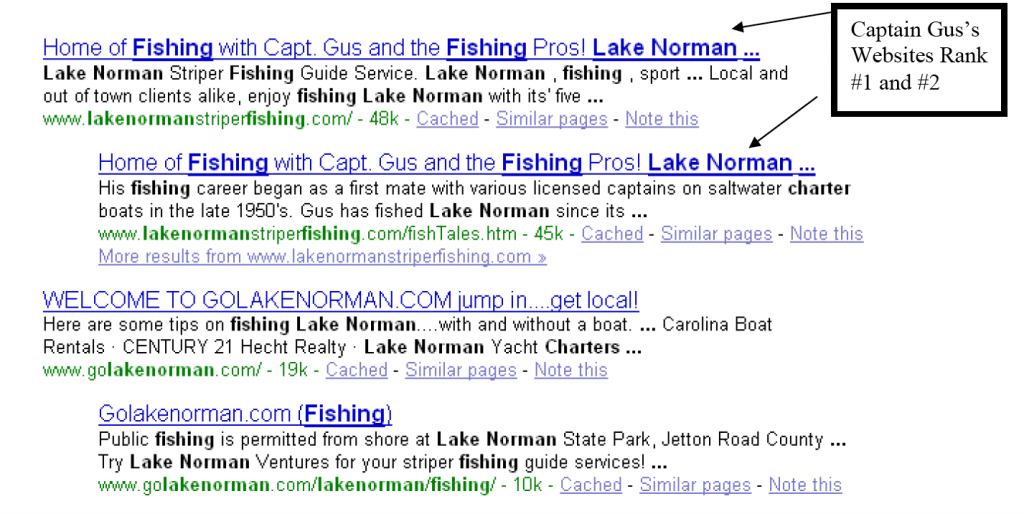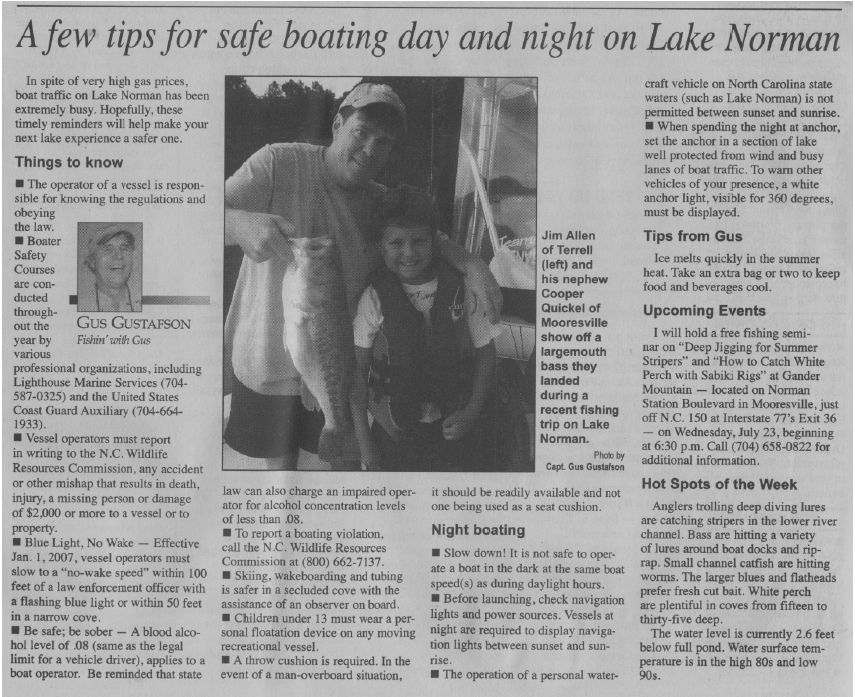Several years ago, we took a vacation to Lake Norman, North Carolina. We rented a nice house on the lake. My oldest daughter had asked if we could go fishing on the lake. I hadn’t fished since I was a kid. Too busy working . I did what any other guy (sissy guy) would do; I looked to hire someone to take us fishing. A real guy would have figured it out by himself. Not me. I’m no Bear Griles.
I went online and searched for fishing charter in Lake Norman. Here is what I found in Google:

Notice the top two websites listed out of 233,000 different possible websites. They both direct visitors to Captain Gus’s website. Capt. Gus is mentioned in the title line of both websites. I also searched “fishing Lake Norman” and guess what? His website was the first website listed in the organic search listing. This simply means he gets tons of free traffic to his website. I would venture to guess that he gets over 50% of the traffic for Lake Norman fishing related searches. He probably got the top spots from numerous incoming links to his website.
Below, I have included a snapshot of Captain Gus’s home page. Notice all of the different pages or links on his website. If you have any interest in fish or fishing at Lake Norman, you’ll more than likely end up at Gus’s website. You can find information on just about anything within one or two clicks. Oh, don’t miss his book, which he sells for $8.95. His book is really just a compilation of fishing stories. I haven’t read the book, but I’ll bet they are funny and entertaining. Each one is also probably an indirect testimonial for his charter fishing business.

After visiting Gus’s website, I remembered reading about him in the local Lake Norman weekly newspaper. I had subscribed to this paper and had it mailed to me in Ohio. I wanted to learn as much about the Lake Norman area, because we were thinking of moving to the area. So I went and checked a few of the Lake Norman Times weekly newspapers and sure enough, there was an article from Captain Gus each week. Here is a copy of one of his articles from the “Lake Norman Times” newspaper:

This article is a masterpiece in marketing. Remember, this is an article, not an advertisement. I don’t know if he pays for this or not. If I had to guess, I would bet that these articles are free for him. This small newspaper needs content and I'm sure they are happy to receive articles from Gus. Let’s study Gus’s article in the weekly paper:
1. Headline is around “safe boating.” This is a big deal on the lake because of boating related injuries during the busy summer months. The headline is sure to draw in readers who own a boat.
2. The article includes Gus’s picture with the phrase
“Fishin’ with Gus.”3. He includes 13 short pointers for boating safety.
4. A section titled
“Tips from Gus”5. The
“Upcoming Events” title promotes a free fishing seminar he will be hosting at Gander Mountain.
6. He includes
“Hot Spots” of the week so you can find where the fish are biting.
7. Last but certainly not least, there is a large picture of a father and son holding a big fish they caught with Captain Gus. Simply awesome!
This article has everything you could possibly want. He is positioned as the fishing expert for the area. A happy client picture proving that he can help you catch fish and have a great time. The hot spots of the week is designed to get you reading his article each week to see where the fish are biting. And finally, he markets an upcoming free fishing class that he will be teaching.
It truly is a marketing masterpiece and should be copied by anyone looking to grow their business. (THIS MEANS YOU!) This newspaper article follows a similar format from week to week, which means he has a template for writing articles. You should have a template for your newsletters or marketing emails.
I ended up calling Gus and hiring him to take us fishing. It was November and the weather was terrible. We had to buy warm clothes for our little fishing day. Gus picked us up on his boat at the dock of our rented house. He had everything we would need, fishing rods, bait, snacks and beverages. We spent a few hours on the lake with about 8 fishing lines in the water without catching a fish. My daughter was getting bored, so we started to head back.
Gus wasn’t happy about leaving without a fish. I could tell that he has a personal rule when fishing with customers. The trip doesn’t end until you catch a fish. Low and behold, we tried a new area and we caught a fish. Our little journey was complete.
During this time, I had the opportunity to talk with Gus. He had some great stories. I learned a great deal. As it turns out, he was a retired corporate guy who enjoyed fishing. He started a fishing charter on the side and it had grown each and every year. I wonder why?
He even had a few different fishing crews. If he was personally booked for a day, he had other people lined up to take you out for the day. His little business was setup to deliver income even if he didn't work.
During this fishing trip, I learned that Gus was part of the Safety Commission for Lake Norman. He was concerned about signs on the Lake. These signs get damaged and/or disappear from weather or vandalism causing safety issues on the lake. He talked about meetings with the mayor and city council and he knew everything going on around the Lake. In simple terms, he was connected which I bet is extremely helpful for his little fishing business. Our trip ended and we headed back home. I often thought about Gus and how he turned his hobby into a lucrative business in retirement.
Since this first vacation to Lake Norman, we've been back several times. On our second trip, we rented our own boat and I had planned to take on the lake without Gus’s help. Our first stop was to Gander Mountain to get our fishing licenses. We also needed bait and some fishing equipment. Remember, I’m a sissy man so I don’t have any of this stuff myself. As we walked into Gander Mountain, I noticed a large sign offering a free fishing class. Guess who was teaching this class?
Captain Gus.
We then got everything we needed and we headed to the checkout line to pay. At the register, I noticed a stack of business cards offering fishing charters.Whose cards do you think I found?

One of the items we purchased at Gander Mountain was a detailed fishing map of Lake Norman. I have scanned part of the map in for you to review. See if you
can find Gus? Hint he is next to Waldo…

Well, did you find Gus? I did. I have reviewed this map thoroughly and didn’t see any other advertisements. His advertisement was the only one. It doesn’t even look like and advertisement, does it?
So, what can we learn from Gus? A lot:
1. Be everywhere your prospective clients are. Gus’s marketing is everywhere someone thinking about fishing would go. If you go fishing in Lake Norman, you’ll hear about Captain Gus one way or another. Do you have the same name recognition Gus does? Will someone thinking of buying, selling or investing in real estate in your area see your marketing? They should.
2. Get connected. Get involved with city council or other community related activities. When Gus told me about his involvement with the Safety Commission, he obtained instant credibility. He knew things other fishermen wouldn’t know about the lake. You should know things about your area that other real estate agents don’t know.
3. His website included information that other websites would link to. His website includes food recipes, weather related information, funny stories, online shopping, pictures and more. His website is the center of fishing in Lake Norman. This attracts many incoming links which help him obtain high search engine ranking.
4. Because he is connected in the community, he was able to get a weekly fishing column in the local newspaper. His weekly column is a masterpiece in marketing. Consider submitting 3 or 4 articles including any photos to your local newspaper. Tell them that they can run these articles whenever they want. Profile your clients in each article and tell their stories. Let them know that you would be happy to provide a weekly column for free. If you’re articles are good, who knows what might happen.
5. He uses pictures of happy clients in everything he does. Keep a camera with you and collect as many photos as you possibly can. These photos can be used in many ways: website, newspaper column, marketing funnel, free classes.
6. Host free classes. Market these free classes in your weekly newspaper column. If you can’t get a free column, consider copying Gus’s article and paying to have it run as an editorial each week/month.
7. Get local businesses to market your free classes. Gander Mountain benefits from Gus in several ways. The first way is that Gus promotes Gander Mountain in his weekly newspaper article. It is the location of his free classes. They receive direct plug each week in his article. He also promotes Gander Mountain on his website. Go back and look at his website above. See the Gander Mountain logo on the top left-hand side? Gander Mountain can promote Gus’s classes to all of their customers giving value added services. Finally, anyone attending one of Gus’s classes has to walk through their store. They get free foot traffic through the store every time Gus teaches a class. It is a win/win business relationship.
8. Look for areas to advertise where you won’t have any competitors. Gus advertises on the Lake Norman fishing map. Where do buyers, sellers and investors look for real estate information in your area? How can you advertise in these places? Be creative. Think outside of the box.
Bottom line: Gus is one smart business man. He knows more about fishing for customers than most business people do. On the surface, most people think Gus is a fisherman. In reality, he is a marketer.
For a limited time, you can download Rob's new marketing report titled "Advanced Online Marketing Strategies for Real Estate Agents" for free at http://www.OnlineStrategiesReport.com




